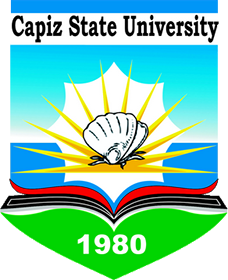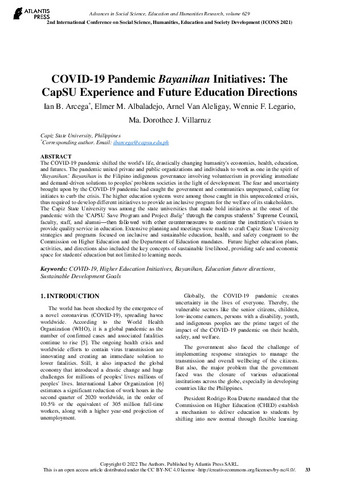COVID-19 pandemic Bayanihan initiatives
| dc.contributor.author | Arcega, Ian B. | |
| dc.contributor.author | Albaladejo, Elmer M. | |
| dc.contributor.author | Aleligay, Arnel Van | |
| dc.contributor.author | Legario, Wennie F. | |
| dc.contributor.author | Villarruz, Ma. Dorothee J. | |
| dc.coverage.spatial | Capiz | en |
| dc.date.accessioned | 2024-03-20T02:19:42Z | |
| dc.date.available | 2024-03-20T02:19:42Z | |
| dc.date.issued | 2022 | |
| dc.identifier.citation | Arcega, I. B., Albaladejo, E. M., Aleligay, A. V., Legario, W. F., Villarruz, M. D. J. (2022). COVID-19 pandemic Bayanihan initiatives: The CapSU experience and future education directions. Atlantis Press, 629, 33-36. | en |
| dc.identifier.uri | https://repository.capsu.edu.ph/handle/123456789/203 | |
| dc.description.abstract | The COVID-19 pandemic shifted the world's life, drastically changing humanity's economies, health, education, and futures. The pandemic united private and public organizations and individuals to work as one in the spirit of ‘Bayanihan.' Bayanihan is the Filipino indigenous governance involving volunteerism in providing immediate and demand-driven solutions to peoples' problems societies in the light of development. The fear and uncertainty brought upon by the COVID-19 pandemic had caught the government and communities unprepared, calling for initiates to curb the crisis. The higher education systems were among those caught in this unprecedented crisis, thus required to develop different initiatives to provide an inclusive program for the welfare of its stakeholders. The Capiz State University was among the state universities that made bold initiatives at the onset of the pandemic with the 'CAPSU Save Program and Project Bulig’ through the campus students’ Supreme Council, faculty, staff, and alumni—then followed with other countermeasures to continue the institution’s vision to provide quality service in education. Extensive planning and meetings were made to craft Capiz State University strategies and programs focused on inclusive and sustainable education, health, and safety congruent to the Commission on Higher Education and the Department of Education mandates. Future higher education plans, activities, and directions also included the key concepts of sustainable livelihood, providing safe and economic space for students' education but not limited to learning needs. | en |
| dc.language.iso | en | en |
| dc.publisher | Atlantis Press | en |
| dc.relation.uri | https://www.atlantis-press.com/proceedings/icons-21/125968137 | en |
| dc.rights | Attribution-NonCommercial-NoDerivatives 4.0 International | * |
| dc.rights.uri | http://creativecommons.org/licenses/by-nc-nd/4.0/ | * |
| dc.subject | COVID-19 | en |
| dc.subject | Higher Education Initiatives | en |
| dc.subject | Bayanihan | en |
| dc.subject | Education future directions | en |
| dc.subject | Sustainable Development Goals | en |
| dc.subject.lcsh | COVID-19 Pandemic, 2020- | en |
| dc.subject.lcsh | Education | en |
| dc.subject.lcsh | Sustainable development | en |
| dc.title | COVID-19 pandemic Bayanihan initiatives | en |
| dc.title.alternative | The CapSU experience and future education directions | en |
| dc.type | Article | en |
| dc.citation.journaltitle | Advances in Social Science, Education and Humanities Research | en |
| dc.citation.volume | 629 | en |
| dc.citation.firstpage | 33 | en |
| dc.citation.lastpage | 36 | en |
| dc.identifier.essn | 23525398 |
Files in this item
This item appears in the following Collection(s)
-
Journal articles published externally [23]
These are journal articles by CAPSU authors published externally.


